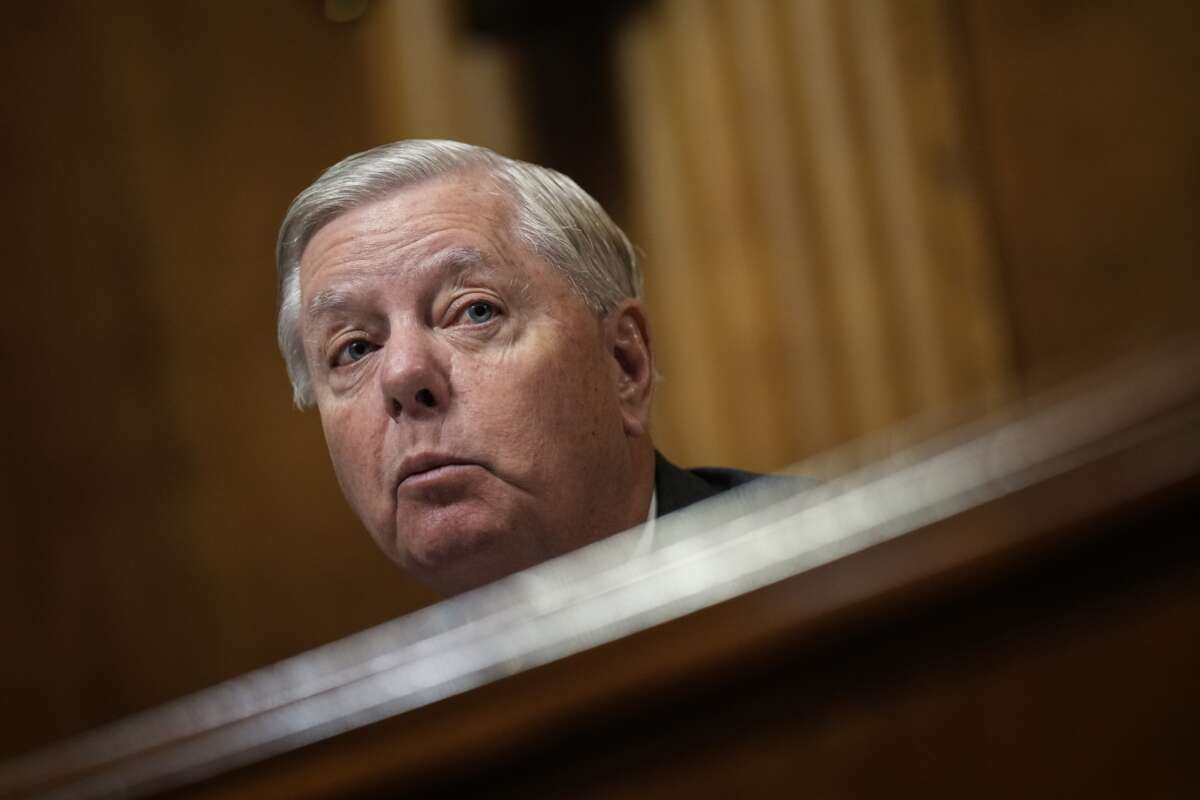A special grand jury that provided recommendations earlier this year to Fulton County, Georgia, District Attorney Fani Willis, regarding who to charge in the inquiry into former President Donald Trump’s attempts to overturn the 2020 election in the state, made around 20 additional suggestions on who to indict — including current U.S. Sen. Lindsey Graham (R-South Carolina).
The names of people who had been recommended but not charged were revealed on Friday following a court order late last month that said the 26-page report should be released to the public.
The recommendations by the special grand jury were made in January of this year. Willis ultimately issued charges against Trump and 17 of his allies on August 14, which include violations of the state’s racketeering law and other statutes relating to pressuring state officials to change the result of an election.
The special grand jury, which can recommend charges against individuals but does not have the power to issue indictments, was requested by Willis ahead of a standard grand jury in order for her to compel testimony from witnesses who could have refused to testify without a subpoena order.
The Fulton County inquiry was initially spurred on by revelations of a January 2021 phone conversation between Trump and Secretary of State Brad Raffensperger (R-Georgia), in which the former president tried to pressure the state’s top election official to overturn now-President Joe Biden’s win in Georgia.
Graham himself testified to the special grand jury last year about phone conversations with Raffensperger, though he tried (and failed) to contest the subpoena order compelling him to do so. Those conversations took place before the infamous Trump call, shortly after the 2020 presidential race was called for Biden, in mid-November 2020.
Raffensperger has said he felt as though Graham was pressuring him to help Trump, as the South Carolina senator, who has no legal authority in Georgia, asked Raffensperger if he had the power to toss out all absentee ballots in counties that had higher rates of envelope signatures that didn’t match state records. Graham has alleged that his calls weren’t part of a pressure campaign, but rather were “investigatory” to help inform his vote during the certification ceremony of the Electoral College.
In addition to Graham, two former Republican U.S. senators from Georgia who were still in office at the time — Kelly Loeffler and David Perdue — were also recommended for charges by the special grand jury.
Ultimately, Willis decided against charging Graham, Loeffler, Perdue and over a dozen other individuals who the special grand jury had said deserved to be charged. Her reasoning for this decision is unclear, but Asha Rangappa, a former FBI special agent and a legal contributor to ABC News, posited on X that had Willis done so, it would have opened the investigation to congressional oversight — including to House Judiciary chair Rep. Jim Jordan (R-Ohio), who has demanded to see records of the case.
“Seeing lots of news reports highlighting that D.A. Fani Willis did not indict U.S. senators despite special grand jury recommendations. Doing so would have 1) [created] potential constitutional hurdles and 2) would give folks like Jim Jordan a clear ‘hook’ to do what he’s doing now,” Rangappa wrote.
In a letter dated this week to Jordan, Willis said she would not comply with his demands to review her records regarding the charges she did issue, stating that his request was a blatant means to “obstruct a Georgia criminal proceeding and to advance outrageous misrepresentations” about the case on Trump’s behalf.
“There is no justification in the Constitution for Congress to interfere with a state criminal matter, as you attempt to do,” Willis added.
A terrifying moment. We appeal for your support.
In the last weeks, we have witnessed an authoritarian assault on communities in Minnesota and across the nation.
The need for truthful, grassroots reporting is urgent at this cataclysmic historical moment. Yet, Trump-aligned billionaires and other allies have taken over many legacy media outlets — the culmination of a decades-long campaign to place control of the narrative into the hands of the political right.
We refuse to let Trump’s blatant propaganda machine go unchecked. Untethered to corporate ownership or advertisers, Truthout remains fearless in our reporting and our determination to use journalism as a tool for justice.
But we need your help just to fund our basic expenses. Over 80 percent of Truthout’s funding comes from small individual donations from our community of readers, and over a third of our total budget is supported by recurring monthly donors.
Truthout has launched a fundraiser to add 500 new monthly donors in the next 10 days. Whether you can make a small monthly donation or a larger one-time gift, Truthout only works with your support.
